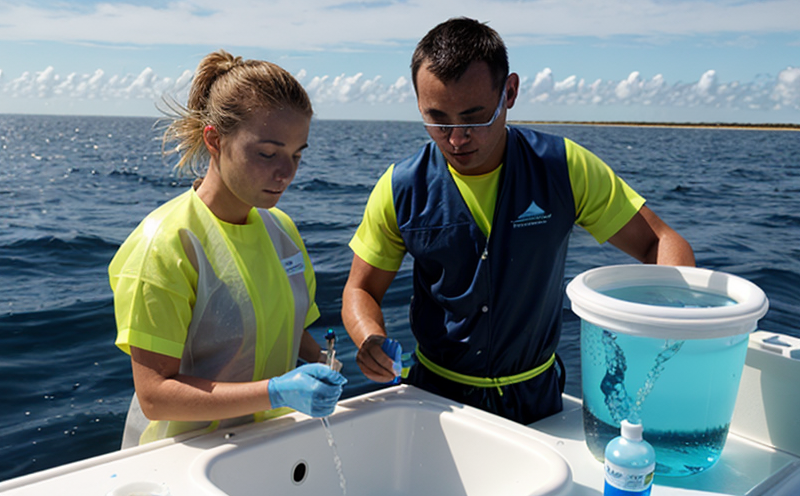ISO 17294 Uranium Test in Seawater
The ISO 17294 standard provides a robust framework for measuring uranium levels in seawater, ensuring compliance with environmental regulations and supporting scientific research. This test is critical for monitoring the impact of nuclear waste or other sources of uranium on marine ecosystems.
Seawater is a complex matrix that can contain numerous dissolved substances, making accurate uranium quantification challenging. The ISO 17294 method overcomes these challenges by employing advanced techniques to isolate and quantify uranium accurately. This service ensures the reliability of data for stakeholders involved in environmental monitoring, regulatory compliance, and scientific research.
The process begins with the collection of seawater samples from designated areas. Samples are then filtered and prepared according to ISO 17294 guidelines. The chosen method typically involves a combination of chemical precipitation followed by atomic absorption spectrophotometry (AAS) or inductively coupled plasma mass spectrometry (ICP-MS). Each step is meticulously recorded, ensuring traceability and reproducibility.
The precision and accuracy of this testing are paramount. The standard specifies an acceptable range for uranium concentration based on environmental and regulatory requirements. Compliance with these criteria ensures that the data generated can be used to make informed decisions regarding maritime activities and environmental conservation efforts.
For quality managers, compliance officers, R&D engineers, and procurement professionals, accurate uranium testing is essential. It helps in identifying potential risks associated with nuclear waste contamination and supports decision-making processes related to sustainable practices and regulatory adherence.
The ISO 17294 method not only ensures precise quantification but also provides a standardized approach that enhances comparability between different studies and monitoring programs. This consistency is vital for understanding long-term trends in uranium levels and their impacts on marine life.
Moreover, this testing plays a crucial role in supporting environmental impact assessments (EIAs) conducted before major projects involving the ocean. By identifying baseline conditions and changes over time, stakeholders can better manage potential risks and implement mitigation strategies effectively.
In summary, the ISO 17294 Uranium Test in Seawater is more than just a laboratory procedure; it represents an integral part of ensuring environmental stewardship and compliance with international standards. Its importance cannot be overstated for those responsible for safeguarding our oceans' health.
Why It Matters
The ISO 17294 Uranium Test in Seawater is essential because it helps identify the presence of uranium and its concentrations within marine environments. This information is crucial for several reasons:
- Environmental Monitoring: Regular testing allows for continuous surveillance of water quality, ensuring compliance with environmental protection laws.
- Risk Assessment: Detecting elevated levels of uranium can help assess potential risks to human health and marine ecosystems.
- Research and Development: Accurate data supports scientific research aimed at understanding the effects of uranium on aquatic life.
The reliability provided by this testing contributes significantly to informed decision-making processes across various sectors, including energy production, environmental conservation, and public health. By adhering to strict standards like ISO 17294, laboratories ensure that their findings are trustworthy and actionable.
Industry Applications
| Application | Description |
|---|---|
| Nuclear Waste Management | Detecting uranium levels helps in managing the disposal and treatment of nuclear waste in marine environments. |
| Environmental Impact Assessments (EIAs) | Baseline data is critical for evaluating potential impacts on marine ecosystems from proposed projects. |
| Marine Biology Research | Understanding uranium levels aids in studying the effects of contaminants on various species and their habitats. |
| Regulatory Compliance | Ensuring compliance with international environmental protection standards is mandatory for many industries. |
| Water Treatment Processes | Monitoring uranium levels ensures that water treatment processes are effective in reducing contaminants before discharge into the ocean. |
| Sustainable Development Initiatives | Data from this testing supports initiatives aimed at preserving marine ecosystems and promoting sustainable practices. |
| Nuclear Power Plants | Testing uranium levels near power plants provides insights into potential contamination risks and aids in preventive measures. |
| Scientific Studies | Accurate data facilitates comprehensive scientific studies focusing on the long-term effects of uranium exposure. |
The table above highlights some key applications where accurate uranium testing is vital. These examples underscore the importance of adhering to standards like ISO 17294, ensuring that all stakeholders involved in these activities have reliable and consistent data.
Eurolab Advantages
At Eurolab, our commitment to excellence extends beyond compliance with international standards; we offer a range of advantages that set us apart:
- Precision and Accuracy: Our state-of-the-art equipment and skilled technicians ensure accurate results every time.
- Comprehensive Reporting: Detailed reports include all necessary metadata, making it easier for clients to interpret findings.
- Dedicated Experts: Our team comprises professionals with extensive experience in environmental testing, providing expertise tailored to your specific needs.
- Timely Delivery: We understand the importance of prompt delivery and strive to meet deadlines without compromising quality.
- Customer Support: Ongoing support ensures that you have access to all necessary resources and guidance throughout the testing process.
- Diverse Capabilities: Eurolab offers a wide range of services, allowing us to address diverse client requirements efficiently.
- Sustainability Focus: Our practices are aligned with sustainability goals, ensuring that our operations have minimal environmental impact.
We pride ourselves on delivering high-quality results while maintaining strong relationships with our clients. Eurolab’s reputation for reliability and accuracy is built on years of experience in the field.





